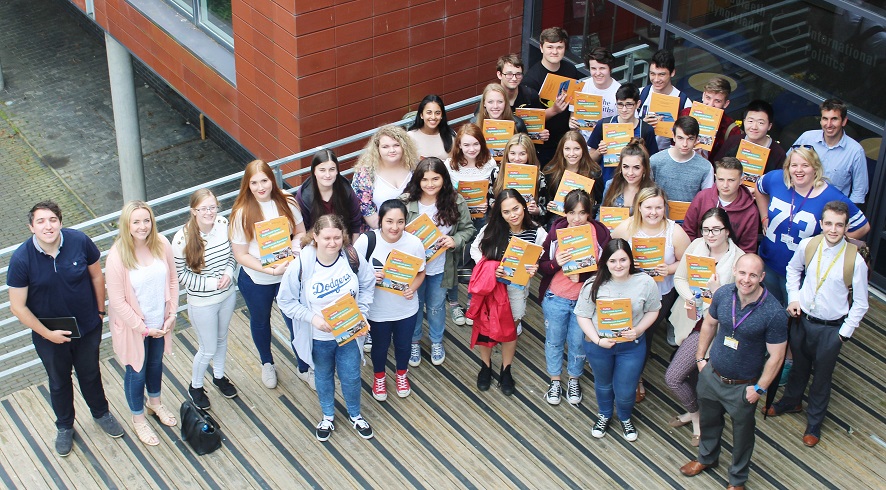Research tips for Welsh Bacc students

Sixth form pupils from Aberdare Community School outside Aberystwyth University’s Department of International Politics building in June 2017
22 June 2017
Aberystwyth University is preparing to host hundreds of sixth-formers in a series of Welsh Baccalaureate Experience Days this summer.
The aim of the educational programme is to offer pupils expert guidance on tackling the Baccalaureate’s Individual Project, as well as allowing them to experience a University campus and visit one of only five copyright libraries in the UK.
The University has been working in partnership on the project with the National Library of Wales and the National Assembly for Wales for the past five years.
Since 2012, more than 2,000 Year 12 students from schools across south and west Wales have visited the University to take part in a Baccalaureate Experience Day.
This year, pupils from eleven different schools will spend a day in Aberystwyth between 22 June – 12 July 2017, including Aberdare Community School, Ysgol Bro Hyddgen, Ysgol Emlyn, Ysgol Rhydywaun, Ysgol Maesydderwen, Ysgol Bro Pedr, Ysgol Bro Myrddin, Ysgol Aberaeron, Gwernyfed, Porth & Ferndale.
Their visits will begin with a workshop led by teaching staff at the Institute of Geography, History, Politics and Psychology.
The aim of the workshop is to help pupils ask the right questions in their Individual Projects and to illustrate different ways of carrying out research.
Also on the itinerary is a visit to the nearby the National Library of Wales where the sixth-formers are given an introduction to the buiildings’s wealth of collections as well as its online resources.
There will be a tour too of the Reading Rooms, exhibitions and restricted areas, as well as instructions on how to join the Library and receive a Reader’s Ticket.
Pupils can also attend a workshop on Harvard referencing, a vital element of the Individual Project.
By using examples from the National Library of Wales collections, they learn how to reference relevant details whilst researching, and how to produce correct citations.
The National Assembly for Wales offers a skills workshop during the day, focusing on the reliability of different sources of information - from Wikipedia to government statements - to help students develop critical thinking and research skills.
The aim is to encourage young people to think about what information they would need for their individual projects before making a decision about where the best place would be to source that information.
The Welsh Baccalaureate Experience is co-ordinated by Dewi Phillips from the Schools & Colleges Liaison Team at Aberystwyth University: “We’re really fortunate here in Aber to have access to inspiring academics, a world-renowned National Library and fantastic support from the National Assembly for Wales which allow us to offer this unique experience for sixth form students. It is important that Higher Education Institutes like Aberystwyth support schools and colleges by offering assistance with an important qualification like the Welsh Baccalaureate and share their knowledge through partnerships like this.”
Rhodri Morgan, Education Officer at the National Library of Wales, said: “One of the priorities of The National Library of Wales is to provide young people with access to its various collections, helping users to interpret the materials and use them in their studies. Also, as part of this productive partnership with Aberystwyth University and the National Assembly for Wales, the National Library is able to promote and support the learning of important skills that are crucial to the students’ education.
Kate Gravell, Education Outreach Officer at the National Assembly for Wales, said: "It's a pleasure to be part of this successful partnership that not only helps young people with the Welsh Baccalaureate Qualification, but also enables us to educate them about the democratic process”.



